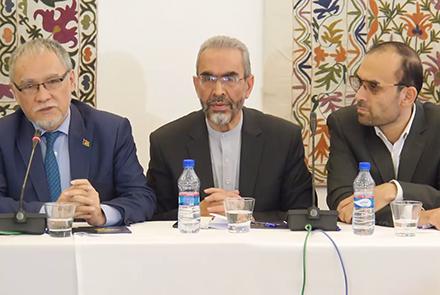Political parties have warned that they will not accept the outcome of elections if the biometric system is not used properly on election day so as to ensure people only vote once.
The political committee of the coalition of parties said the groundwork for the use of the biometric system has been laid and that the election commission should allow all registered voters to cast their ballots.
The committee also suggested that where possible the biometric devices should be connected to the internet on the day of elections.
“The use of biometric technology in cities and centers (of provinces) and the areas which have internet services should be done online because the use of the system offline will recorded repeated and invalid votes and to discard these votes will be extremely difficult,” said Noor Rahman Akhlaqi, a member of Jamiat-e-Islami.
The parties also suggested that the fingerprint recording process on polling day should include two fingers of each voter and that the photo on their ID cards should also be recorded.
“We want real biometrics, biometrics which can satisfy the nation. Meanwhile, we consider it our right to know about the details of the contract which was signed between government and the company,” said Humayun Jarir, a member of Hizb-e-Islami.
Based on government information, the contract for the supply of the biometric units was signed with a German firm, Dermalog.
The Independent Election Commission said the use of the biometric system would help prevent electoral fraud and that the only people who will be allowed to vote will be those who have already registered.
On the issue of the devices being connected to the internet on polling day, Sayed Hafizullah Hashemi, an IEC spokesman, said he was not sure that this would be possible.
“I don’t think that we can use it online (for all centers). We will be happy if government will provide internet to 21,000 polling stations. But if the internet is not ready, we will go ahead offline,” said Hashemi.
Meanwhile, addressing an event in Balkh on Saturday, President Ashraf Ghani said government is committed to holding elections on time.
“A democratic government cannot be sustained without elections. We hope that it has been proved to you that your ‘server’ is the one who has put pressure on holding the elections on the scheduled time,” he said.
A thorough monitoring on the electoral process, separating fraudulent and valid votes, giving information on details of government’s contract with the biometric company and a change in the election system are the main demands of political parties and movements.
How reliable are these devices?
The biometric devices which will be used on election day do appear to be flawed and don’t seem able to differentiate details in some instances – especially if they are used offline, election officials said.
The commission has received 22,000 biometric units and has started sending them to provinces. The commission is installing local languages into the devices before sending them to provinces.
TOLOnews reporter Gulabuddin Ghubar meanwhile tested the device and used it exactly as it would be used for election day – except that it was not connected to the internet.
He first recorded fingerprints of one person and took a picture of the voter registration sticker on the back of this person’s ID. He then took an ID photo of a second person – and entered it as if this was being done for one voter. The device failed to pick up the discrepancies and printed the slip validating the voter as one person and not two.
“So far the Independent Election Commission has not been able to take a good decision in a suitable time. There could be problems when they go forward,” said Yusuf Rasheed, CEO of Free and Fair Election Foundation of Afghanistan.
“The ID photograph of every person should be included automatically in biometric information system (by using the inbuilt camera). If it is not like this, it means that every voter could register his fingerprints and provide another picture instead of his own picture,” said Noor Rahman Akhlaqi, a member of the political committee of political parties and movements.
The Independent Election Commission however acknowledged that there were problems with the system when offline and that they hoped the problems could be resolved before election day.


